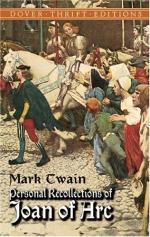The doctors of the University had to see those creatures in order to know; and if Joan was deceived, it is argument that they in their turn could also be deceived, for their insight and judgment were surely not clearer than hers.
As to the other point which I have thought may have proved a difficulty and cost the University delay, I will touch but a moment upon that, and pass on. The University decided that it was blasphemy for Joan to say that her saints spoke French and not English, and were on the French side in political sympathies. I think that the thing which troubled the doctors of theology was this: they had decided that the three Voices were Satan and two other devils; but they had also decided that these Voices were not on the French side—thereby tacitly asserting that they were on the English side; and if on the English side, then they must be angels and not devils. Otherwise, the situation was embarrassing. You see, the University being the wisest and deepest and most erudite body in the world, it would like to be logical if it could, for the sake of its reputation; therefore it would study and study, days and days, trying to find some good common-sense reason for proving the Voices to be devils in Article No. 1 and proving them to be angels in Article No. 10. However, they had to give it up. They found no way out; and so, to this day, the University’s verdict remains just so—devils in No. 1, angels in No. 10; and no way to reconcile the discrepancy.
The envoys brought the verdict to Rouen, and with it a letter for Cauchon which was full of fervid praise. The University complimented him on his zeal in hunting down this woman “whose venom had infected the faithful of the whole West,” and as recompense it as good as promised him “a crown of imperishable glory in heaven.” Only that!—a crown in heaven; a promissory note and no indorser; always something away off yonder; not a word about the Archbishopric of Rouen, which was the thing Cauchon was destroying his soul for. A crown in heaven; it must have sounded like a sarcasm to him, after all his hard work. What should he do in heaven? he did not know anybody there.
On the nineteenth of May a court of fifty judges sat in the archiepiscopal palace to discuss Joan’s fate. A few wanted her delivered over to the secular arm at once for punishment, but the rest insisted that she be once more “charitably admonished” first.
So the same court met in the castle on the twenty-third, and Joan was brought to the bar. Pierre Maurice, a canon of Rouen, made a speech to Joan in which he admonished her to save her life and her soul by renouncing her errors and surrendering to the Church. He finished with a stern threat: if she remained obstinate the damnation of her soul was certain, the destruction of her body probable. But Joan was immovable. She said:
“If I were under sentence, and saw the fire before me, and the executioner ready to light it—more, if I were in the fire itself, I would say none but the things which I have said in these trials; and I would abide by them till I died.”




